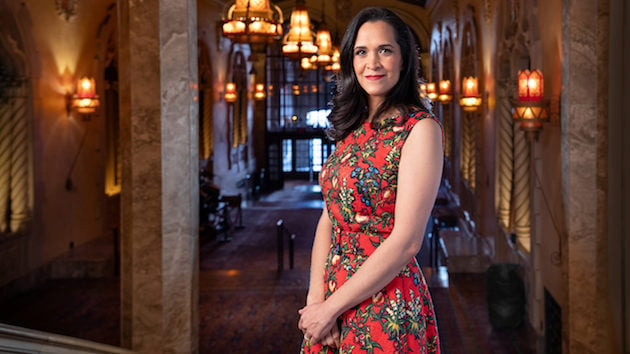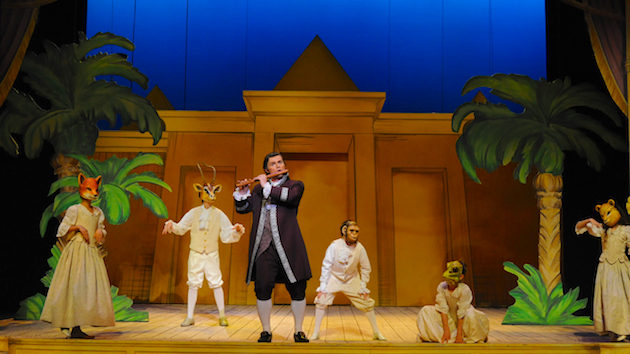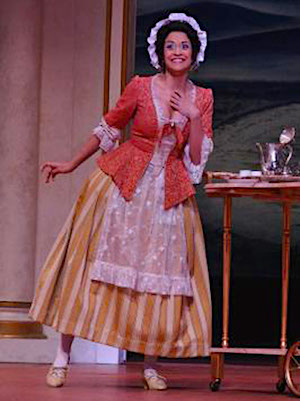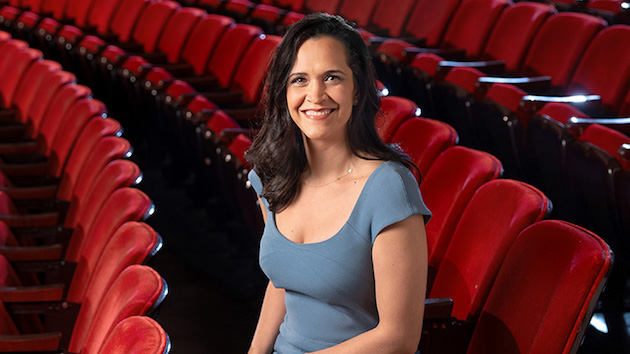
All of us are worried now. Whether you’re in the arts world or any other subset of human economic activity you’re worried about the aftermath, about which businesses and organizations that you may have taken for granted will still be there after the COVID-19 crisis passes. This was Khori Dastoor’s concern a week ago when, as the new general director of Opera San José, she was faced with shutting down a production of Mozart’s The Magic Flute.
You know, I was saying to my husband the other day, I don’t know how five million dollars is so complicated — it’s not a huge amount but in opera there are so many thousands of people who are involved and relying on us. And even the decision to prioritize the safety of everybody and to postpone or reschedule this production, I had to spend three days just notifying all the relevant parties. There’s no way to shortcut how much work and time and logistical planning it is.
At 11 a.m., this is the first thing I did: I walked into the rehearsal room. We had, probably 40 young singers prepared to work through Act II. They had all come from many different states, just gotten off a plane, settling into a new city, a new job, a new gig, and I had to let them know that we were going to be rebooking them all home. And from there, I walked into my company staff meeting and shared the same news and from there I had to notify all the unions in writing and from there I started to check in with our major institutional funders and from there I started to check in with all our individual donors and from there we had to let our subscribers know — it just went on and on and on.
In a way, it’s taught me an important lesson about the impact of what we do because it can feel — we focus a lot on “Oh gosh, we have so much inventory for this one Thursday performance,” and, “look, we have only a 70 percent-filled house,” so we’re handwringing a lot. But the irony is, I don’t really think of going to the opera as pleasure anymore, because I go and I’m running budgets in my mind and I’m looking at what choices they made and thinking about programming for our company — and all I want to do now is go to the opera. I would love to sit in the dark and watch Fidelio or watch Wozzeck, because I don’t really know what else to do. I don’t want to talk to people, I feel cooped up in my house, and the thing that would bring me the most solace would be to just sit in an opera house. And maybe that’s because I don’t feel I have that option right now.
It makes me feel sad that we can’t support the community and give them that catharsis at this moment. But it also makes me feel like, when we get through this on the other side, we’ll have, perhaps, a deeper appreciation of our local arts infrastructure. And I can only hope that there are enough of us still in business to be able to serve the public after this is over.”

I asked her if there was financial contingency planning that would help get the company through this and she answered, “It’s entirely in the hands of our patrons between making that choice of whether to get the refund, which of course we’re offering to anyone who wants it, or whether they can make that donation. And that’s an individual choice that comes down to their own retirement account reeling from the Dow Jones, and many other things. But I have to say that the early returns are incredibly inspiring. Of the patrons who have contacted us, we’ve seen a 65 percent donation rate, which is higher than we had modeled, and much higher than our donor rate. (Of our subscriber base, about 50 percent of them are also donors.)

“It’s not a cheap ticket, an opera ticket. But if we can compel people to make that choice, or even to make the choice to [let us] welcome them to a future event with a credit, that will mean the world to us as far as our plans for next season and our future viability.”
Dastoor, in this crisis, is relying on the skills she has honed in her roles in the artistic administration of Opera San José, where she’s worked since 2013, and the creative forward thinking that saw her make such a splash with the announcement of the first season she planned, for 2020–2021. “You have to be disciplined in being relentlessly optimistic and charting a path forward. And especially so if you’re a manager or a leader, because otherwise you lose your footing really quickly,” she says.
Dastoor was thinking about the larger questions of viability and about her own experience as a soprano soloist when she came up with the idea of setting up a musician’s relief fund, a giving opportunity to help highly exposed artists, whose livelihoods are now in jeopardy. The home page of the Opera San José website is now prominently displaying a link to give to the fund.
“Sure, contractually I can lay off people,” she says, “but if they don’t have work and they can’t be here then I can’t just call them six months from now and say ‘OK, now I’m ready to give you your hourly carpenter position back, please report for duty.’ They won’t be here. So it’s not just being altruistic, we need to maintain the infrastructure that we’ve built in our scene shop, in our costume shop, in our box office, and, of course, the orchestra is getting it from all sides. We share many players with Symphony Silicon Valley, which has also been canceling, so these people have to pay their rent, one way or another. So that’s what the relief fund is for.”
Like many good ideas, this one came from a familiar place:
“I was in the shower the other day and I was thinking about all the faces looking at me, you know, and I thought ‘what the hell are they going to do?’ I remember being an artist and having that same feeling of, ‘OK, I can pay my rent for six weeks and then I’ll just live with this friend’ — I mean, that’s how the life is. And I think, at some point, it’s very tiring to be three decades into your career as a professional violist and still feel like the ground beneath your feet is ever eroding and, I don’t know, just speaking to the [company] members and hearing them say, ‘we understand, you’re doing the right thing. We don’t want to risk patron health.’ I just, I couldn’t bear it. And I thought, you know, we do rely on one another in these moments of challenge and Opera San José is a very family feeling institution. I know all my subscribers. We know all our donors — If you’re a thousand-dollar donor at Opera San José, you’re a big deal. So I knew they would step up if we told them that these people need us now. Especially since we’re saying, ‘We’ll see you in May — maybe.’ I mean, hopefully not, but this could be a longer winter than we know. So, I just wanted to create the opportunity.”

Dastoor says that people are responding, many in small-dollar donations, “and what I’m looking at, even more than the numbers is just the messages that are coming in. I think artists need to hear from the public. It’s a solace for our artists to know, one, that a company appreciates that they’re the heart and soul of what we do, and, two, that the patrons want to stand with them, even though we’re all stressed and panicked. That what they give to other people does have value to their lives. And I’ve got now the ability to keep my resident company on salary till the end of the fiscal year.”
And that gives Dastoor ideas. “What are they going to be doing? They’re going to be taping singing telegrams for little virtual thank-you cards for the people who donate to this fund, they’re going to be helping out in supporting the company and communicating with our patrons and doing all these things that generally we don’t have the bandwidth to do.”
But there are limits, and she is realistic about the survival of some of her ambitious plans. “Maybe we can try to make more lemonade as we go, but we can’t do this for a long time. We can get through for a matter of weeks, not months. That’s just the way the margins work in the business.
I do feel, in moments like these, really aware of our privilege as a mature institution. It’s different to be almost 40 years old than to be [an organization with] $100,000 or less. And, as with AB5 and other things that have threatened the arts ecosystem, it’s always the smaller groups that bear the brunt of these things. But my next season is all about collaborating with groups like that. Sangam Arts is going to be working with the British Raj [setting of The Marriage of] Figaro around providing bhangra and kathak dance, we’ve got the Flamenco Society of San José partnering with us on Carmen, so if these little groups go away, then the artistic richness of what we’re planning for next year would be really compromised.”

In the meantime, Dastoor is just trying to recoup losses from The Magic Flute. “Flute was 90 percent built, right? And if we stop it right now, then we’ve lost a lot of investment. And if I know that we’re going to try to bring it in a future slot, then we’re finishing it, we’re finishing building the floor, we’re going to finish the costume work and put it back into storage ready to go. So it’s a lot of day-to-day thinking about, ‘how do we save $500 here, so that next time we don’t have to spend it again. A lot of it, inevitably, is just written off.”
In the end, the musician’s relief fund is a stopgap, but it points to a larger problem that shadowed my entire conversation with Dastoor. As she looked to the 2021 season, she said,
I used to be able to call many, many more people to cover my roles than I can call today. We’re just losing artists every year because of the pressures of this region. And so the biggest existential threat to me is not my budget deficit or production cost, it’s the talent bleed. I’m really nervous about what kind of talent pool I’ll have to pull from in the fall, when I’m needing a chorus of 36 people for Carmen. Who’s going to be here?
We used to have so many subscribers and they would be homeowners and you wouldn’t have to remarket to them. But in Silicon Valley now, people don’t buy homes and they don’t live here for longer than two years, so you’re in a constant acquisition phase to try find the people who’ve just moved to work at Google for three years on an H-1 visa, to try to get them to come to the opera. And then they’re gone as soon as you get them.
Artists have a unique set of challenges in the state of California, I would say, and in the Bay Area in particular.”




